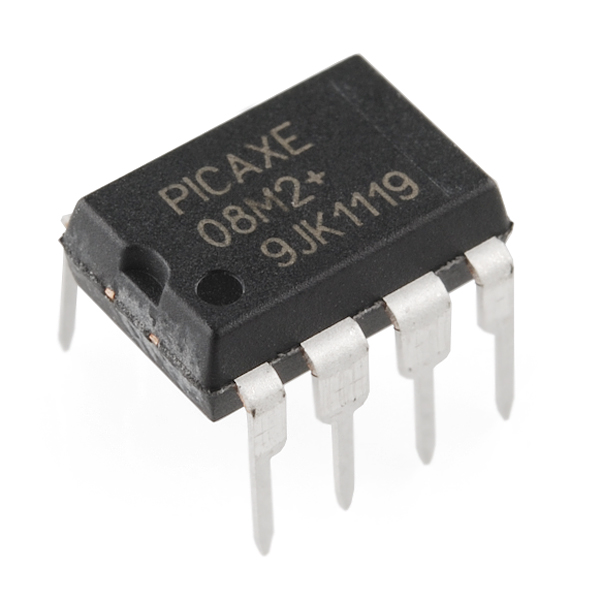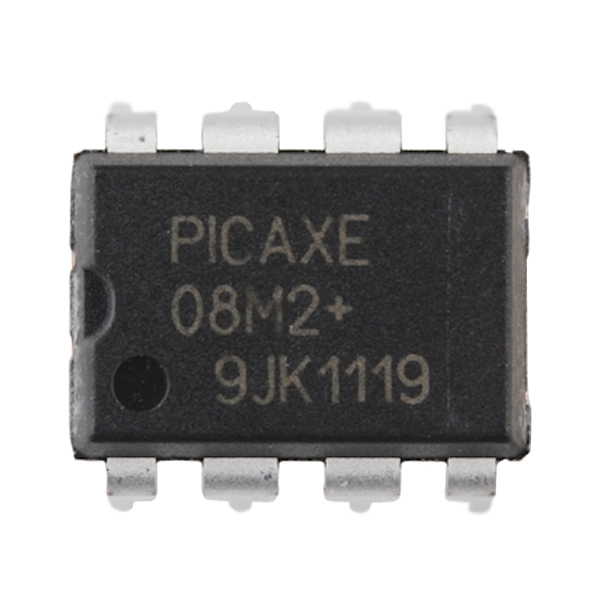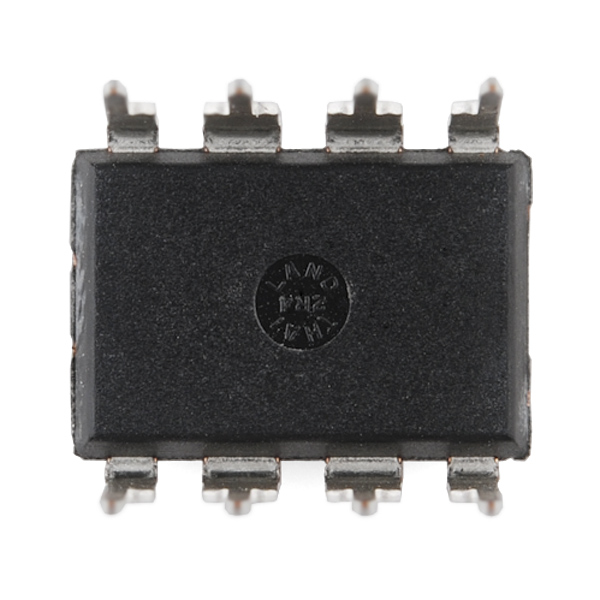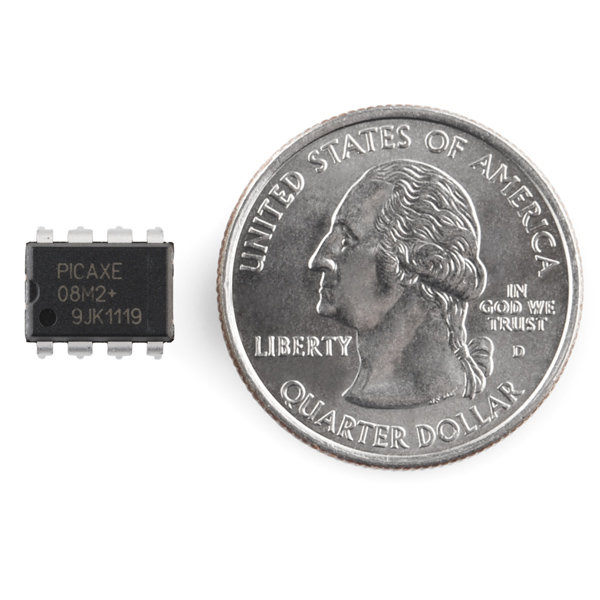PICAXE 08M2 Microcontroller (8 pin)
PICAXE-08M2 microcontroller chip.
PICAXE is a neat entry-level microcontroller system that is relatively cheap to get started with. The chip is programmed with a simple serial connection and the BASIC development environment is free! PICAXE has some excellent educational applications and support, and is a great entryway into more complicated embedded systems. If you're look for a place to start with microcontrollers, PICAXE is a great way to go!
NOTE: The markings on these ICs vary. You may get an IC which says PIC12F1840 instead of 08M2. These are both the same Microcontroller. For more information, check here.
PICAXE 08M2 Microcontroller (8 pin) Product Help and Resources
Core Skill: Soldering
This skill defines how difficult the soldering is on a particular product. It might be a couple simple solder joints, or require special reflow tools.
Skill Level: Rookie - The number of pins increases, and you will have to determine polarity of components and some of the components might be a bit trickier or close together. You might need solder wick or flux.
See all skill levels
Core Skill: Programming
If a board needs code or communicates somehow, you're going to need to know how to program or interface with it. The programming skill is all about communication and code.
Skill Level: Competent - The toolchain for programming is a bit more complex and will examples may not be explicitly provided for you. You will be required to have a fundamental knowledge of programming and be required to provide your own code. You may need to modify existing libraries or code to work with your specific hardware. Sensor and hardware interfaces will be SPI or I2C.
See all skill levels
Core Skill: Electrical Prototyping
If it requires power, you need to know how much, what all the pins do, and how to hook it up. You may need to reference datasheets, schematics, and know the ins and outs of electronics.
Skill Level: Competent - You will be required to reference a datasheet or schematic to know how to use a component. Your knowledge of a datasheet will only require basic features like power requirements, pinouts, or communications type. Also, you may need a power supply that?s greater than 12V or more than 1A worth of current.
See all skill levels
Comments
Looking for answers to technical questions?
We welcome your comments and suggestions below. However, if you are looking for solutions to technical questions please see our Technical Assistance page.
Customer Reviews
5 out of 5
Based on 4 ratings:
1 of 1 found this helpful:
Simple, versatile, powerful.
Great beginner MCU. Lots of information on how to use them. Bought 2. Made a serial cable and programmed using a generic USB to serial adapter then soldered up the two resistors. Used thoroughly without any problems. Ran a serial LCD, made sounds with piezo elements, controlled with an infrared remote, touch feature is cool. Pairs well with an l293d, I drove 4 separate 12v LEDs, relays, and then 2 small motors. I even reversed the polarity for about a minute with a 3.7v lipo battery and it still works. Got real hot so I'd say durable too. Probably work great as a teaching tool.
1 of 1 found this helpful:
Very Capable..!!
For a chip that uses interpreted BASIC this micro-controller is very capable. I'm a long time assembly and C programmer that uses Arduino and Teensy on a regular basis but many tasks can be much easier to accomplish with this chip. The PICAXE system is simple, mature, robust, and it 'just works'. It never ceases to amaze me how so many tasks can be so easy to do with a PICAXE.
1 of 1 found this helpful:
Capable and cheap
Love these things. So easy. So cheap. The dev boards https://www.sparkfun.com/products/8321 Make it really easy to create a one off project for less than $10.
Packs a big punch in a small package





Mabye I'll wire a house line voltage to one (because they're so cheap!) and see if it explodes!
Use an 8-pin PIC without the PicAxe bootloader/interpreter... it'll be even cheaper, and just as good for generating electronic smoke. (Although, I can tell you from personal experience: PICs can take quite a bit of abuse).
Also consider the ATTiny 85 which can be programmed by an arduino. It can even use just it's internal oscillator to obviate the need for an external crystal. Here's an example I made.
I know these can run down to 2.3V, and support using 2xAAA alkaline batteries. But I will still need to get a separate regulated supply to power the common 3.3V sensors Sparkfun sells (pressure, accelerometer etc), is this correct? Or does the PICAXE step-up the voltage itself so I can power 3.3V sensors with 2xAAAs?
My project is basically a PICAXE with a pressure sensor and a compass which reads data and uses it to turn on LEDs and move a small servo.
2014 will soon be here. Isn't it time for a full lineup of surface mount picaxe chips?
Very few carry the SMD lineup of the PICAXE chips. I don't think they're offered in bulk discounts to resellers like the TH versions are. But I would bet many who would order them would also get a few other parts, offsetting the low profit margin (if that's the reason). I would really like to see Sparkfun carry the 14M2, and 20X2 in SMD format.
Will you be getting these back in anytime soon? I'd like to buy three.
Hi! We are going to get these back in stock. I recommend checking back at the end of this month or the beginning of next month. (They sold out fairly fast the last time we had them in!)
can i run this at 3.3v?
The datasheet tells all (I wouldn't want to spoil the surprise for you!)
WE NEED MORE PICAXE O8M2 please!
I would like it if Sparkfun carried the surface mount versions too. I have used them, they are so small and easy to program. Arduino is OK I use that too, but it is much more work to get an Arduino into the volume of an 08M2.
Sparkfun, do you have the picaxe IC's but in SMD package???
MORE PICAXE, please.
Any idea when more will be coming in? The lack of stock is stifling my creativity! (or some such thing)
LIKE!!!
The new and improved E-Z microcontroller is back!!!
Woohoo!